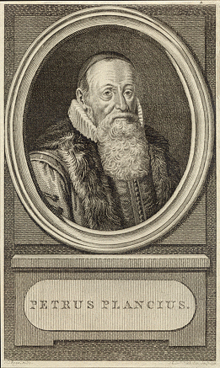Petrus Plancius | |
|---|---|
 Petrus Plancius by J. Buys/Rein. Vinkoeles (1791) | |
| Born | Pieter Platevoet 1552 |
| Died | 15 May 1622 (aged 69–70) |
| Nationality | Flemish |
| Known for | Netherlandish cartography |
| Scientific career | |
| Fields |
|
| Institutions | Dutch Reformed Church |
Petrus Plancius (Dutch: [ˈpeːtrʏs ˈplɑŋkijʏs]; born Pieter Platevoet [ˈpitər ˈplaːtəvut]; 1552 – 15 May 1622) was a Dutch-Flemish astronomer, cartographer and clergyman. Born, in Dranouter, now in Heuvelland, West Flanders, he studied theology in Germany and England. At the age of 24 he became a minister in the Dutch Reformed Church.
Plancius fled from Brussels to Amsterdam to avoid religious persecution by the Inquisition after the city fell into Spanish hands in 1585. In Amsterdam he became interested in navigation and cartography and, having access to nautical charts recently brought from Portugal, he was soon recognized as an expert on safe maritime routes to India and the nearby "spice islands". This enabled colonies and port trade in both, including what would become the Dutch East Indies, named after the Dutch East India Company set up in 1602. He saw strong potential in the little-mapped Arctic Sea and strongly believed in the idea of a Northeast Passage until the failure of Willem Barentsz's third voyage in 1597 seemed to preclude its viability.